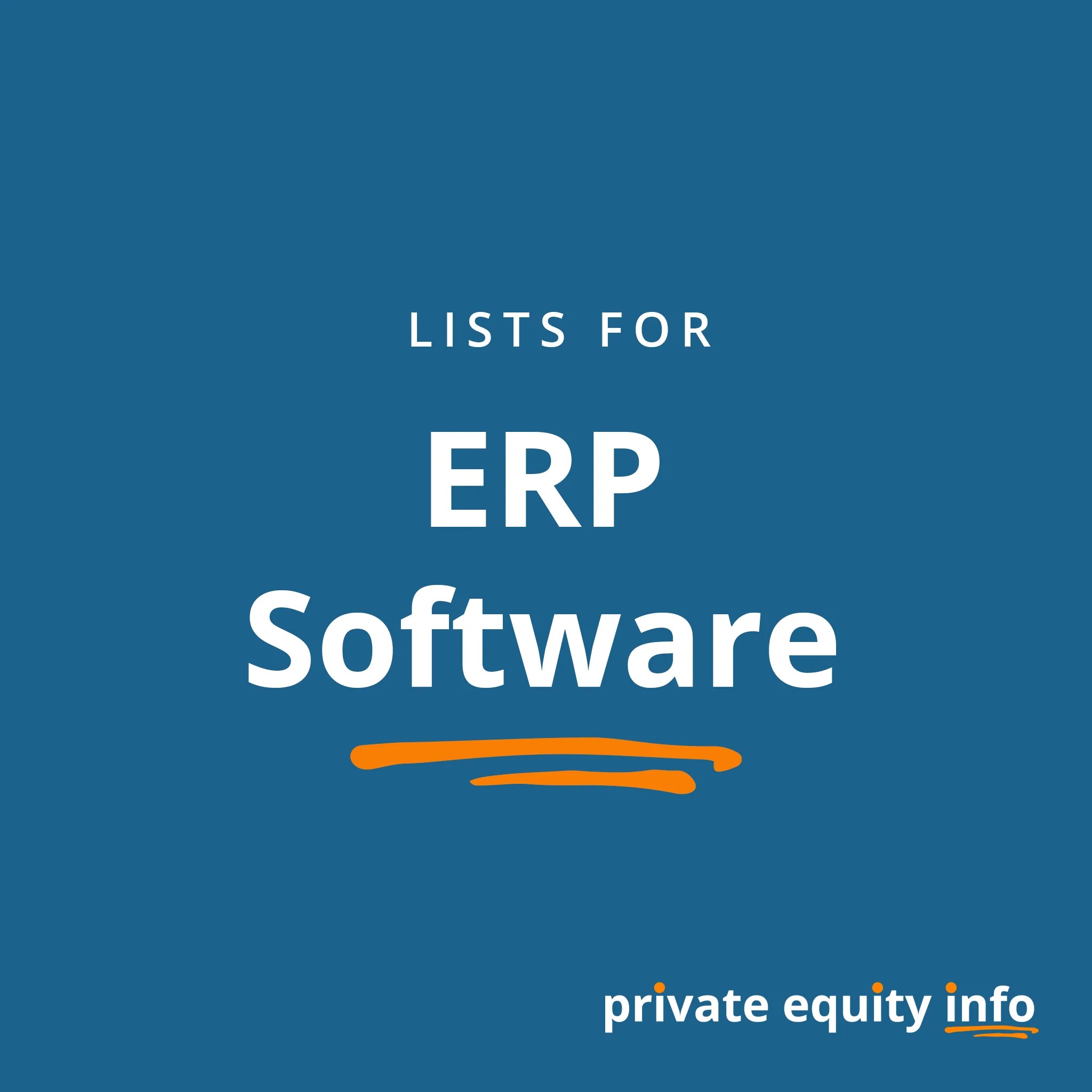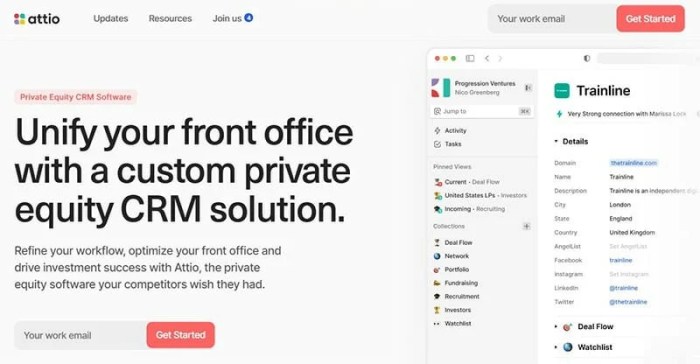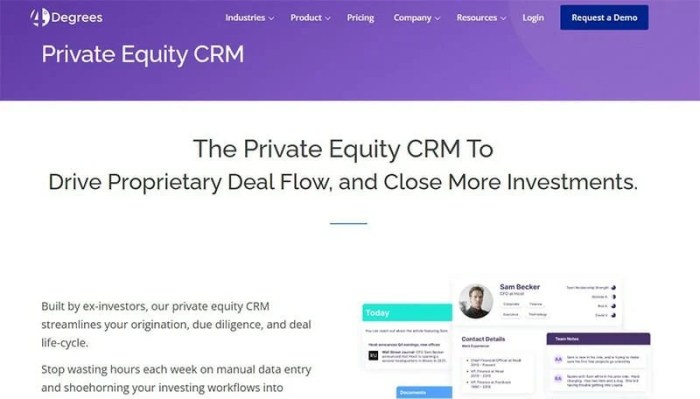The private equity (PE) industry operates at a frenetic pace, juggling complex deals, managing extensive networks, and tracking intricate financial data. Success hinges on efficiency and insightful decision-making. This is where Private Equity CRM software steps in, transforming how PE firms manage their operations and ultimately, their bottom line. This detailed guide explores the crucial role of a dedicated PE CRM, its key features, benefits, and considerations for selection.
Understanding the Needs of Private Equity Firms: Private Equity Crm Software
Private equity firms face unique challenges demanding specialized software solutions. Unlike other industries, PE requires a system that can handle:
- Complex Deal Management: Tracking numerous deals simultaneously, from initial sourcing to exit, involving multiple stakeholders and intricate financial details.
- Extensive Relationship Management: Maintaining and nurturing relationships with limited partners (LPs), general partners (GPs), portfolio companies, and potential investment targets.
- Comprehensive Financial Tracking: Managing investments, capital calls, distributions, and performance metrics across a diverse portfolio.
- Regulatory Compliance: Adhering to stringent reporting and disclosure requirements.
- Data Security and Confidentiality: Protecting sensitive financial and investor information.
A generic CRM simply won’t suffice. A robust Private Equity CRM must be tailored to address these specific demands, providing a centralized platform for managing all aspects of the investment lifecycle.

Source: privateequityinfo.com
Key Features of Private Equity CRM Software
Effective PE CRM software incorporates several critical features to streamline operations and enhance decision-making:
Deal Management Capabilities
- Deal Pipeline Management: Visualizing the progress of deals through each stage, from sourcing to closing.
- Document Management: Securely storing and accessing all deal-related documents, including term sheets, NDAs, and financial models.
- Automated Reporting and Analytics: Generating insightful reports on deal flow, performance, and key metrics.
- Collaboration Tools: Facilitating seamless communication and collaboration among internal teams and external stakeholders.
- Integration with other systems: Seamlessly integrating with accounting software, portfolio management systems, and other critical applications.
Relationship Management Tools
- Contact Management: Maintaining detailed profiles of LPs, GPs, portfolio company executives, and other key contacts.
- Interaction Tracking: Recording all communications and interactions with contacts, including emails, phone calls, and meetings.
- Relationship Mapping: Visualizing relationships between different contacts and organizations.
- Automated Communication: Sending personalized emails and reminders to contacts.
Financial Reporting and Analytics, Private equity crm software
- Portfolio Performance Tracking: Monitoring the performance of investments across the entire portfolio.
- Capital Call and Distribution Management: Managing capital calls, distributions, and other financial transactions.
- Financial Modeling and Forecasting: Building and managing financial models to project future performance.
- Customizable Reporting: Generating customized reports tailored to specific needs and requirements.
Security and Compliance
- Data Encryption: Protecting sensitive data with robust encryption techniques.
- Access Control: Restricting access to sensitive information based on user roles and permissions.
- Audit Trails: Tracking all user activity within the system.
- Compliance with Regulations: Ensuring compliance with relevant regulations, such as GDPR and CCPA.
Benefits of Implementing Private Equity CRM Software
Investing in a dedicated PE CRM offers numerous benefits:
- Improved Deal Flow Management: Streamlining the deal process from sourcing to closing, reducing cycle times and increasing deal closure rates.
- Enhanced Relationship Management: Strengthening relationships with LPs, GPs, and other key stakeholders.
- Better Portfolio Management: Improving the oversight and management of investments across the portfolio.
- Increased Efficiency and Productivity: Automating repetitive tasks and freeing up time for more strategic activities.
- Improved Decision-Making: Providing access to real-time data and insights to support better decision-making.
- Reduced Operational Costs: Streamlining processes and reducing manual effort.
- Enhanced Regulatory Compliance: Ensuring compliance with relevant regulations and minimizing risk.
Choosing the Right Private Equity CRM Software
Selecting the right PE CRM requires careful consideration of several factors:
- Specific Needs and Requirements: Identify the specific needs and requirements of your firm, including deal flow, relationship management, and financial reporting.
- Scalability: Choose a system that can scale with your firm’s growth.
- Integration Capabilities: Ensure the system integrates seamlessly with other critical applications.
- User-Friendliness: Select a system that is intuitive and easy to use for all users.
- Vendor Support: Choose a vendor that provides excellent customer support and training.
- Cost: Consider the total cost of ownership, including licensing fees, implementation costs, and ongoing maintenance.
Frequently Asked Questions (FAQ)
- Q: What is the difference between a general CRM and a Private Equity CRM? A: A general CRM lacks the specialized features required for managing complex PE deals, relationships, and financial data. A PE CRM is specifically designed to address the unique needs of the private equity industry.
- Q: How much does Private Equity CRM software cost? A: The cost varies significantly depending on the vendor, features, and number of users. Expect to pay a monthly or annual subscription fee.
- Q: How long does it take to implement a Private Equity CRM? A: Implementation time depends on the complexity of the system and the size of the firm. It can range from a few weeks to several months.
- Q: What are the key metrics to track in a Private Equity CRM? A: Key metrics include deal flow, deal closure rates, portfolio performance, LTV (lifetime value) of relationships, and capital calls/distributions.
- Q: Can a Private Equity CRM integrate with my existing systems? A: Most reputable PE CRMs offer robust integration capabilities with accounting software, portfolio management systems, and other applications.
Conclusion
Private Equity CRM software is no longer a luxury; it’s a necessity for firms aiming to thrive in today’s competitive landscape. By streamlining operations, enhancing decision-making, and improving relationships, a well-chosen PE CRM delivers a significant return on investment. Take the time to carefully evaluate your needs and choose a solution that empowers your firm to achieve its full potential.

Source: founderjar.com
References
While specific product recommendations are avoided to maintain objectivity, researching reputable CRM providers specializing in the financial sector (including those catering to private equity) will yield valuable information. Look for case studies and reviews to inform your decision. You can also consult resources like industry publications and analyst reports focusing on financial technology (FinTech) and CRM solutions for further insights.
Call to Action
Ready to transform your firm’s operational efficiency and investment performance? Contact us today for a consultation to discuss your specific needs and explore how a tailored Private Equity CRM solution can benefit your business.
Question & Answer Hub
What are the key features of private equity CRM software?
Key features often include deal tracking, contact management, due diligence management, portfolio company monitoring, reporting and analytics, and integration with other financial software.
How much does private equity CRM software cost?
Pricing varies widely depending on the vendor, features included, and the number of users. Expect a range from several hundred to several thousand dollars per month.
What are the common integration points for a private equity CRM?
Common integrations include financial modeling software, legal document management systems, and investor portals.
How can I choose the right private equity CRM for my firm?

Source: founderjar.com
Consider your firm’s size, specific needs, budget, and the level of technical support offered by different vendors. A thorough evaluation of features and demos is crucial.
